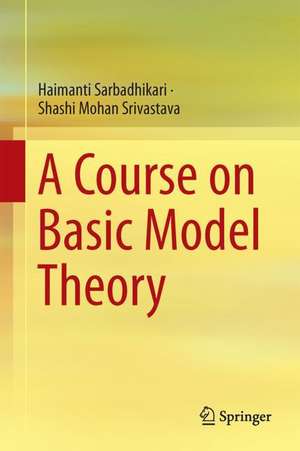A Course on Basic Model Theory
Autor Haimanti Sarbadhikari, Shashi Mohan Srivastavaen Limba Engleză Hardback – 14 sep 2017
The book can be used for both teaching and self-study, ideally over two semesters. It is primarily aimed at graduate students in mathematical logic who want to specialise in model theory. However, the first two chapters constitute the first introduction to the subject and can be covered in one-semester course to senior undergraduate students in mathematical logic. The book is also suitable for researchers who wish to use model theory in their work.
| Toate formatele și edițiile | Preț | Express |
|---|---|---|
| Paperback (1) | 422.31 lei 6-8 săpt. | |
| Springer Nature Singapore – 12 dec 2018 | 422.31 lei 6-8 săpt. | |
| Hardback (1) | 506.29 lei 6-8 săpt. | |
| Springer Nature Singapore – 14 sep 2017 | 506.29 lei 6-8 săpt. |
Preț: 506.29 lei
Preț vechi: 595.63 lei
-15% Nou
Puncte Express: 759
Preț estimativ în valută:
96.91€ • 105.30$ • 81.46£
96.91€ • 105.30$ • 81.46£
Carte tipărită la comandă
Livrare economică 22 aprilie-06 mai
Preluare comenzi: 021 569.72.76
Specificații
ISBN-13: 9789811050978
ISBN-10: 981105097X
Pagini: 291
Ilustrații: XIX, 291 p.
Dimensiuni: 155 x 235 x 25 mm
Greutate: 0.61 kg
Ediția:1st ed. 2017
Editura: Springer Nature Singapore
Colecția Springer
Locul publicării:Singapore, Singapore
ISBN-10: 981105097X
Pagini: 291
Ilustrații: XIX, 291 p.
Dimensiuni: 155 x 235 x 25 mm
Greutate: 0.61 kg
Ediția:1st ed. 2017
Editura: Springer Nature Singapore
Colecția Springer
Locul publicării:Singapore, Singapore
Cuprins
Chapter 1. Basic Introductory Concepts.- Chapter 2. Basic Introductory Results.- Chapter 3. Spaces of Types.- Chapter 4. Good Structures and Good Theories.- Chapter 5. Morley Categoricity Theorem and Forking Independence.- Chapter 6. Model Theory of Valued Fields.
Recenzii
“It is primarily written for graduate students in mathematical logic. … The book is written very carefully, the proofs are clear. It can be recommended to everyone interested in model theory.” (Martin Weese, zbMATH 1425.03001, 2019)
“It covers both the basic terminology and results of the discipline as well as more sophisticated results … and also provides interesting applications to other areas of mathematics, notably algebra. … An instructor of a graduate course in this topic would certainly want to give this book a look … To summarize and conclude: a useful book to have on one’s shelves … .” (Mark Hunacek, MAA Reviews, December, 2017)
Notă biografică
H. SARBADHIKARI graduated from the Indian Statistical Institute, Kolkata, in 1979 under the supervision of Prof. A. Maitra. She was a Ford Foundation Fellow at the University of California, Los Angeles, in 1979, and a visiting assistant professor at the University of Illinois, Chicago, in 1980. She joined the Indian Statistical Institute, Kolkata, in 1980, as the permanent faculty and retired from the position of professor in 2010. Her primary research interest is in descriptive set theory.
S.M. SRIVASTAVA graduated from the Indian Statistical Institute, Kolkata, in 1980, under the supervision of Prof. A. Maitra. He was a member of the Institute for Advanced Studies, Princeton, during the academic year 1979-80. He joined the Indian Statistical Institute, Kolkata, in 1980, as the permanent faculty and is currently a higher academic grade professor. His primary research interest lies in descriptive set theory. He is the recipient of the Indian National Science Academy medal for young scientists. He is the author of the books A Course on Borel Sets and A Course on Mathematical Logic (both published by Springer). He is an enthusiastic teacher and has written several expository articles aimed at popularising mathematical logic and set theory in India.
S.M. SRIVASTAVA graduated from the Indian Statistical Institute, Kolkata, in 1980, under the supervision of Prof. A. Maitra. He was a member of the Institute for Advanced Studies, Princeton, during the academic year 1979-80. He joined the Indian Statistical Institute, Kolkata, in 1980, as the permanent faculty and is currently a higher academic grade professor. His primary research interest lies in descriptive set theory. He is the recipient of the Indian National Science Academy medal for young scientists. He is the author of the books A Course on Borel Sets and A Course on Mathematical Logic (both published by Springer). He is an enthusiastic teacher and has written several expository articles aimed at popularising mathematical logic and set theory in India.
Textul de pe ultima copertă
This self-contained book is an exposition of the fundamental ideas of model theory. It presents the necessary background from logic, set theory and other topics of mathematics. Only some degree of mathematical maturity and willingness to assimilate ideas from diverse areas are required.
The book can be used for both teaching and self-study, ideally over two semesters. It is primarily aimed at graduate students in mathematical logic who want to specialise in model theory. However, the first two chapters constitute the first introduction to the subject and can be covered in one-semester course to senior undergraduate students in mathematical logic. The book is also suitable for researchers who wish to use model theory in their work.
The book can be used for both teaching and self-study, ideally over two semesters. It is primarily aimed at graduate students in mathematical logic who want to specialise in model theory. However, the first two chapters constitute the first introduction to the subject and can be covered in one-semester course to senior undergraduate students in mathematical logic. The book is also suitable for researchers who wish to use model theory in their work.
Caracteristici
Broadens readers understanding through its brief, lucid, and focused content on model theory Provides a systematic approach with plenty of examples and exercises to learn the topic quickly Presents a quick stepping stone to further research in model theory Includes supplementary material: sn.pub/extras
